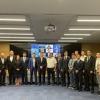Search
Displaying Results 51 - 75 of 117
Many incidents in freight transport are attributed to poor practices in the packing of freight containers, including inadequate securing of cargo, overloading and incorrect declaration of contents. The victims of these incidents may be the general public or transport and supply chain workers, who
Source: UNECE Statistical Database (www.unece.org/stats/data), Eurostat and CISSTAT In 2016, the gross domestic product (GDP) of the European Union (EU) increased by 1.9 per cent compared to the previous year. GDP also grew in the USA by 1.6 per cent. In the countries of the Commonwealth of
In Kyiv, a high-level multi-stakeholder meeting on 28 March 2017 marked the restart of the UNECE-assisted water policy process after a six-year pause. Some 50 participants from key stakeholder organizations attended the meeting of the newly formed National Policy Dialogue (NPD) Steering
Source: UNECE Statistical Database (www.unece.org/stats/data), Eurostat, CISSTAT and national statistics. Data for 2014 in the EU are based on quarterly statistics and do not include the fourth quarter for Croatia, Denmark, Iceland, Ireland, Luxembourg, Malta, Slovenia and Sweden yet. Data
Growing water scarcity, climate variability and increasing water needs for economic development have led to a rising global interest in water allocation practices. Especially where rivers, lakes and groundwater bodies cross national borders, the competing demands of countries and sectors for
Countries along the middle corridor that connects Central Asia with Europe have agreed on concrete next steps to accelerate the interconnection of their national customs systems with the eTIR international system in an effort to digitalize transit in the region.
At a recent TIR Executive Board
With the COVID-19 pandemic, Trade facilitation has acquired even greater importance for the land-locked countries of Central Asia, as it helps remove burdensome formalities for their trade and transport operations. Simplifying and digitalizing procedures helps diminish physical contacts along
Lockdowns, border closures and restrictions to contain the COVID-19 pandemic have disproportionately impacted landlocked developing countries (LLDCs) in Central Asia and the Caucasus, which already face significant economic challenges due to the lack of territorial access to the sea and higher
The nations of Central Asia – Kazakhstan, Kyrgyzstan, Tajikistan, Turkmenistan and Uzbekistan – together with Afghanistan and Azerbaijan, are undergoing significant transformations as they advance in their implementation of the 2030 Agenda for Sustainable Development. However, these countries
Experts from UNECE member States and the secretariat will be visiting Bulgaria from 11 to 21 April 2016 for a field mission in the framework of the third environmental performance review (EPR) of the country. The team will meet governmental officials and representatives of international
UNECE and the Renewable Energy Policy Network for the 21st Century (REN21), in close cooperation with the International Energy Agency (IEA), have joined forces to develop the UNECE Renewable Energy Status Report, which aims at closing the data and information gap as well as tracking future
Thanks to UNECE and its Environmental Monitoring and Assessment Programme, the global “data revolution” needed to ensure sustainable development and monitor progress in achieving the future sustainable development goals (SDGs) is well under way in the countries of Eastern and South-Eastern Europe
UNECE will undertake a study of the regulatory and procedural barriers to trade in Albania. The announcement was made during the visit of UNECE Executive Secretary Christian Friis Bach to Albania, on 26-27 January, where he participated in the National Conference in Elbasan and held a series of
The Covid-19 pandemic continues to hit hard the countries of the United Nations Special Programme for the Economies of Central Asia (SPECA) and highlights the need to diversify from current, resource-dependent models of economic development. This will mean putting ‘innovation and technology that
Kazakhstan, Kyrgyzstan, Tajikistan, Turkmenistan and Uzbekistan have faced development challenges since they became independent in the early nineties. Recent years have seen more activities aimed at fostering greater stability, prosperity, sustainability and transboundary cooperation
Reducing the risks of industrial accidents and associated environmental emergencies requires action at all levels. This ranges from strengthening international cooperation and assistance, to enhancing national capacities for risk reduction, and – crucially – building skills and awareness on the
UNECE environmental performance reviews (EPRs) can play an important role in supporting the achievement and monitoring of the Sustainable Development Goals (SDGs). EPRs can assess the progress made by a country in achieving the relevant SDGs, identify challenges and provide recommendations to
The UNECE’s international standards and recommendations in the areas of innovation and Public-Private Partnerships (PPPs) will make a strong contribution to the immense task of achieving the United Nations Sustainable Development Goals (SDGs). This was the consensus of participants in the tenth
The production and international trade of dried fruits and nuts has increased steadily over the past decade and is expected to continue growing. Helping structure the offer of local producers and implementing international trading standards is of vital importance for major producing countries
Experts will gather in Chisinau from 10-12 September to discuss how to better utilize administrative data sources and censuses to improve the measurement of migration and its impact, and how to reach “hard-to-count” migrant populations. They will also decide on concrete follow-up activities to
Momentum is growing on the digitalization of the Middle Corridor, linking the European Union and Asia, through Central Asia, the Caucasus, Türkiye and Eastern Europe, through the use of UNECE and UN/CEFACT standards for digitalization of multimodal data and document exchange.
Representatives of
Public-Private Partnerships (PPPs) have become one of the preferred mechanisms for financing the Sustainable Development Goals (SDGs) in many countries in the UNECE region. Through its approach to PPPs for the SDGs, UNECE supports countries identifying, developing and implementing infrastructure
In recent years, countries in the Caucasus and Central Asia have made significant progress in developing national forest monitoring systems and have committed to implement large-scale forest landscape restoration. The Astana Resolution and the commitment of the region in 2018 to restore over 2.5
What are the interlinkages between Sustainable Development Goals on sustainable energy (SDG 7) and gender equality (SDG 5)? How can improving understanding of gender dimensions within the energy sector and promoting women’s participation in energy-related decision-making drive progress in both
Experts from UNECE member States and the secretariat will be visiting Bosnia and Herzegovina from 27 March to 6 April 2017 for a field mission in the framework of the third environmental performance review (EPR) of the country. The team will meet governmental officials and representatives of






